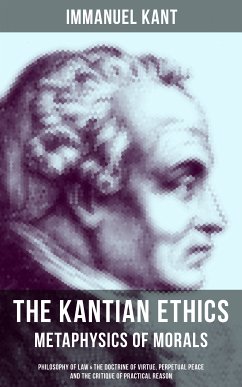
The Ethical Principles of Immanuel Kant (eBook, ePUB)
Versandkostenfrei!
Sofort per Download lieferbar
2,13 €
inkl. MwSt.
Weitere Ausgaben:

PAYBACK Punkte
0 °P sammeln!
In "The Ethical Principles of Immanuel Kant," the renowned philosopher delineates the foundational concepts of his deontological ethics, emphasizing the significance of duty, rationality, and moral law. The text engages readers through a rigorous examination of the categorical imperative, asserting that moral actions are dictated by principles universally applicable to all rational beings. Kant's sharp, analytical prose reflects the Enlightenment's call for reasoned discourse while laying the groundwork for subsequent ethical theories, situating his work within a broader philosophical context ...
In "The Ethical Principles of Immanuel Kant," the renowned philosopher delineates the foundational concepts of his deontological ethics, emphasizing the significance of duty, rationality, and moral law. The text engages readers through a rigorous examination of the categorical imperative, asserting that moral actions are dictated by principles universally applicable to all rational beings. Kant's sharp, analytical prose reflects the Enlightenment's call for reasoned discourse while laying the groundwork for subsequent ethical theories, situating his work within a broader philosophical context that grapples with the nature of morality during an era of profound intellectual upheaval. Immanuel Kant, a pivotal figure in modern philosophy, was motivated by a desire to reconcile the competing demands of science and morality within a rational framework. His upbringing in a Pietist household informed his quest for ethical certainty, while his academic pursuits exposed him to the limitations of empirical knowledge. Kant's profound engagement with metaphysics, epistemology, and ethics culminated in this seminal work, which seeks to offer a coherent moral compass amid the complexities of human experience. Readers seeking a deeper understanding of ethical behavior will find Kant's principles not only thought-provoking but essential for navigating moral dilemmas in contemporary society. "The Ethical Principles of Immanuel Kant" serves as a foundational text for philosophers, ethicists, and anyone interested in the rigorous application of reason to moral questions, inviting them to reflect on their moral duties with clarity and depth.
Dieser Download kann aus rechtlichen Gründen nur mit Rechnungsadresse in A, B, BG, CY, CZ, D, DK, EW, E, FIN, F, GR, HR, H, IRL, I, LT, L, LR, M, NL, PL, P, R, S, SLO, SK ausgeliefert werden.













